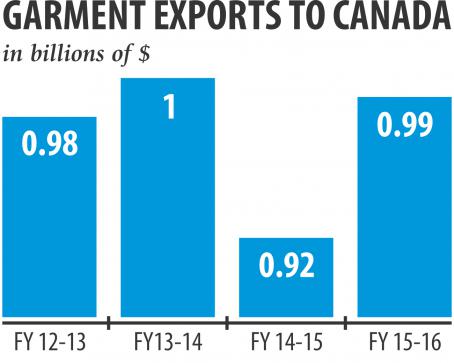Garment shipments to Canada, one of the major export destinations for Bangladeshi manufacturers, dropped 7 percent to $437.78 million in the first half of this fiscal year on the back of lower demand.
“The decline is due to global slump in demand for apparel,” said Faruque Hassan, vice-president of Bangladesh Garment Manufacturers and Expor-ters Association.
In 2015, the demand for apparel items slid 7.8 percent globally and the decline continued in 2016 at the same rate, he said.
As a result, Bangladesh’s garment exports to some other major countries declined as well.
In recent years, Bangladesh’s competitors like India, Vietnam, Cambodia and Sri Lanka have managed to increase their shipments to Canada, which might be another reason for the decline, Hassan said.
Masud Rahman, president of the Canadian Chamber of Commerce in Bangladesh, begs to differ. “The figure for the July-December period is just a temporary blip.”
He is optimistic that shipments to Canada, where Bangladesh enjoys zero-duty benefit, will pick up soon.
Bilateral trade between the two countries crossed the $2 billion mark a few years ago, which is a significant achievement, he said. Garment exports now make up 95 percent of Bangladesh’s exports to Canada.
To make the most of the zero-duty benefit it enjoys, Bangladesh should diversify its export basket, incorporating products like leather and leather goods, plastic goods and pharmaceuticals, Rahman added.
Rahman’s optimism is not unfounded as Canadian apparel retailers have invited many Bangladeshi garment factories to attend the Apparel Textile Sourcing Canada, the biggest garment exhibition in the North American country.
The gathering, which is scheduled to take place from August 21 to 23, will be attended by apparel and textile manufacturers from more than 20 countries.
Manufacturers China, Bangladesh, India, Pakistan, the US, UK, Canada, Turkey, Jordan, Switzerland, Vietnam, Nepal and more will share with Canadians their latest products and production processes in an effort to forge new business relationships.
Source: The Daily Star

